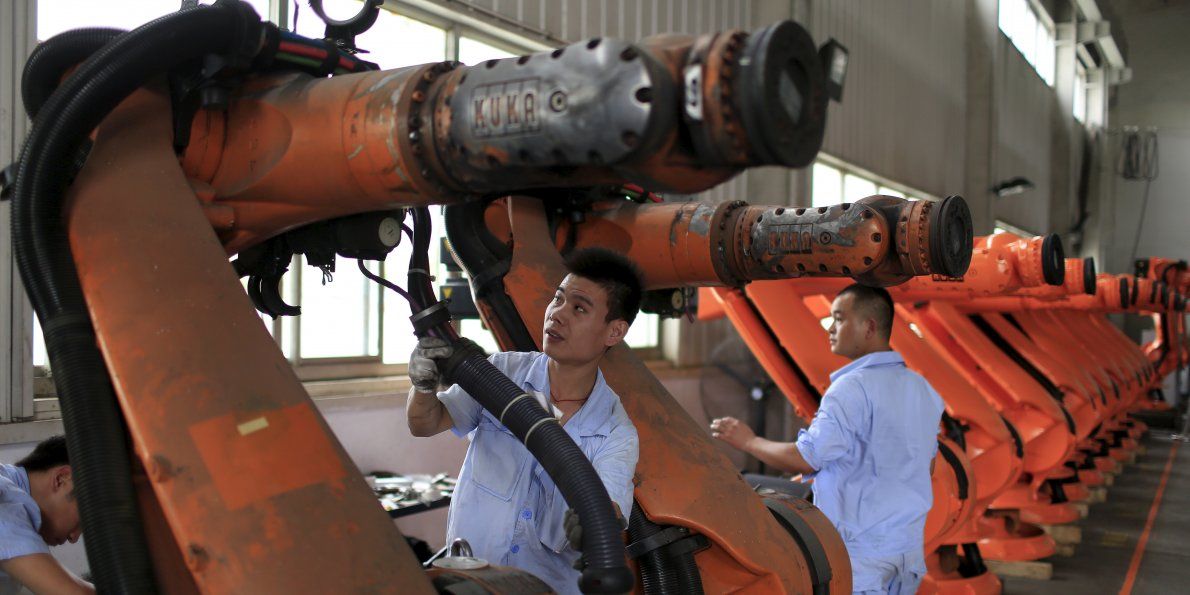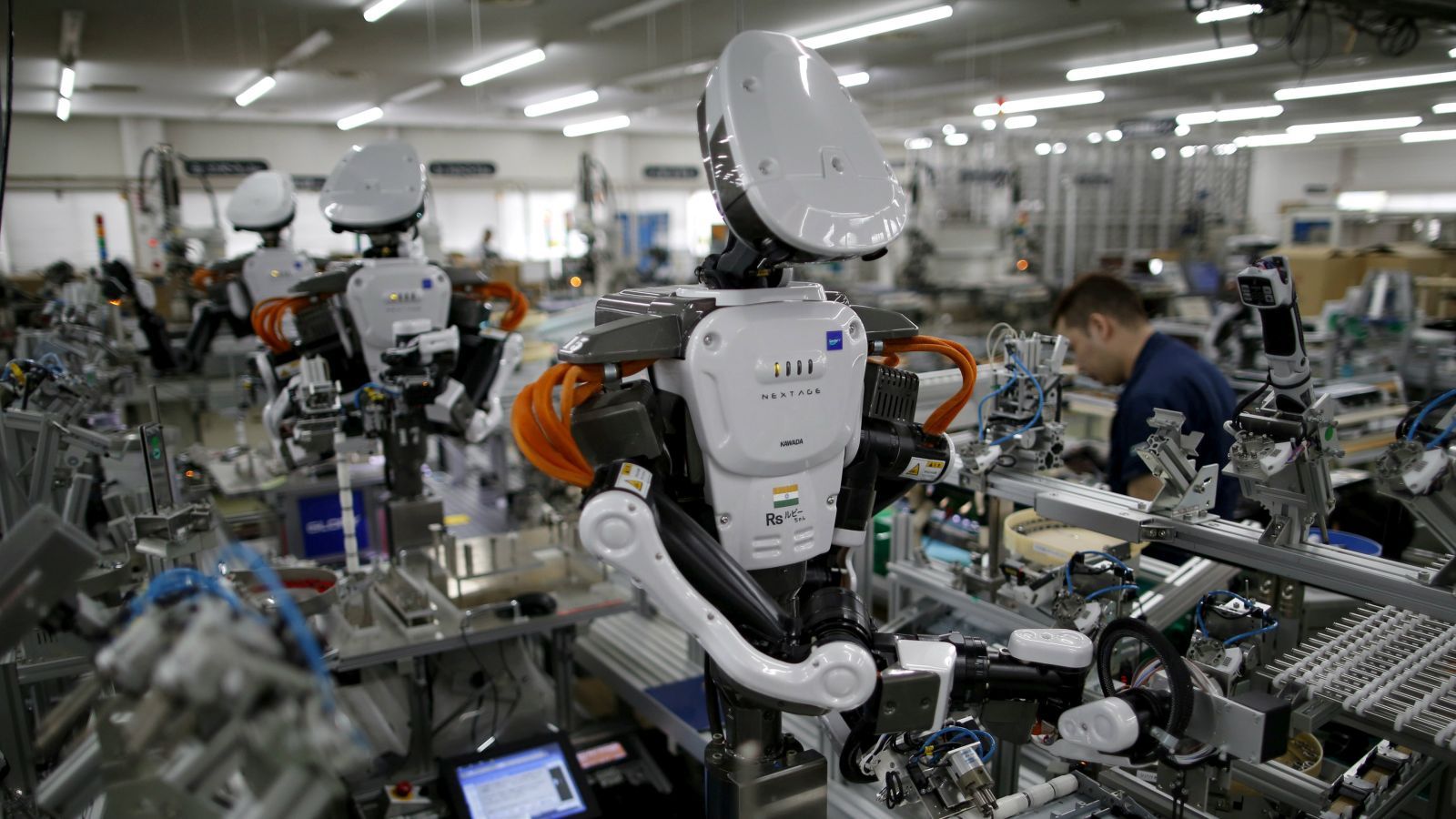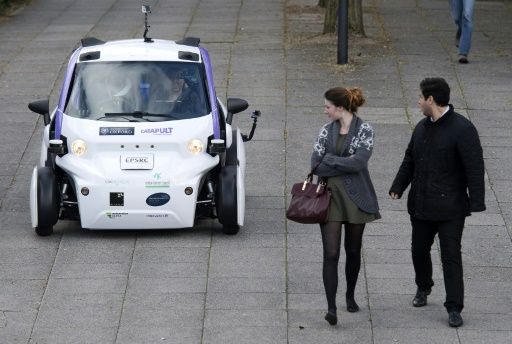President Trump has vowed to bring back American manufacturing jobs. But the evidence is overwhelming that foreign-made robots are the future.


Sometimes people bring up overpopulation scenarios where the population can fit inside Texas. But they ask, what about all the stuff that supports that population? Here is one answer.
Located in an abandoned 70,000-square-foot factory in Newark, New Jersey, the world’s largest vertical farm aims to produce 2,000,000 pounds of food per year. This AeroFarms operation is also set up to use 95% less water than open fields, with yields 75 times higher per square foot. Their stacked, high-efficiency aeroponics system needs no sunlight, soil or pesticides. The farm’s proximity to New York City means lower transportation costs and fresher goods to a local market. It also means new jobs for a former industrial district.
Around the world, urban farms are sprouting up at the intersection of new growing technologies and localvore movements. They vary in scale and focus, but their goals are generally similar: produce fruits and vegetables in more efficient, cheaper and greener ways. Growing in controlled environments also reduces environmental variables, like pests, weather and even seasons (allowing for more predictable year-round yields). Factory farm tenants can also take over and adaptively reuse structures in depressed areas with disused industrial building stock, creating employment opportunities in the process.
In a way, these endeavors are a natural extension of long-standing trends in farming. Small farms gave way to large farms, but the latter still involved open fields and variable environments. Urban farms take things to the next level, making the farm-to-table distance shorter, controlling conditions and further optimizing around available space.
Your job isn’t safe. Nearly half of the jobs in America today may soon be done by robots.
Robots will begin delivering Domino’s pizza starting this summer. The small, six-wheeled devices go 4 miles per hour and will drop the pizzas off within a one-mile radius of its stores in the Netherlands and Germany.
It’s part of a the robotification of American jobs. Indeed, almost half of the jobs in America are at risk of being done by robots on computers in the next two decades, a study by researchers at Oxford University found.

The fear that automation in the form of robots or artificial intelligence is going to destroy jobs is widespread. But it can be difficult to gauge just how serious to take the threat. Different reports offer different estimations of how many jobs will be lost, while politicians and economists argue that technology creates as many jobs as it destroys, maintaining an equilibrium in employment over the long run.
But is this really true? A new study from the National Bureau of Economic Research aims to add some solid numbers to the debate, looking at the historical effects of robots on employment in the US. Economists Daron Acemoglu and Pascual Restrepo studied the US labor market between 1990 and 2007, looking at employment rates in different areas and industries while controlling for the influence of factors like increased imports from China and the offshoring of jobs.

In his final speech as US president, Barack Obama warned of the “relentless pace of automation that makes a lot of good, middle-class jobs obsolete.” Bill Gates, co-founder of Microsoft, has said that governments will need to tax robots to replace forgone revenue when human workers lose their jobs.
If the past is prologue, these concerns are warranted.
In a recent study (pdf), economists Daren Acemoglu of MIT and Pascual Restrepo of Boston University try to quantify how worried we should be about robots. They examine the impact of industrial automation on the US labor market from 1990 to 2007. They conclude that each additional robot reduced employment in a given commuting area by 3–6 workers, and lowered overall wages by 0.25–0.5%.

For centuries, humans have been fretting over “technological unemployment” or the loss of jobs caused by technological change. Never has this sentiment been accentuated more than it is today, at the cusp of the next industrial revolution.
With developments in artificial intelligence continuing at a chaotic pace, fears of robots ultimately replacing humans are increasing.
TNW Conference won best European Event 2016 for our festival vibe. See what’s in store for 2017.


Are robots coming for your job?
Although technology has long affected the labor force, recent advances in artificial intelligence and robotics are heightening concerns about automation replacing a growing number of occupations, including highly skilled or “knowledge-based” jobs.
Just a few examples: self-driving technology may eliminate the need for taxi, Uber and truck drivers, algorithms are playing a growing role in journalism, robots are informing consumers as mall greeters, and medicine is adapting robotic surgery and artificial intelligence to detect cancer and heart conditions.

It does not make any sense misery still exist in THIS world if there is only one job left on planet earth. Because, if nobody works in the production of things, logically these things will cost nothing because there are no workers to pay for them!